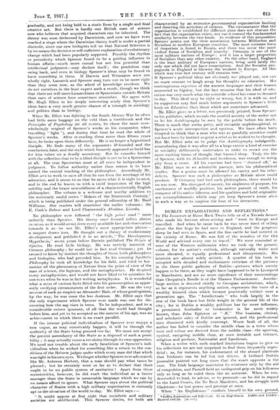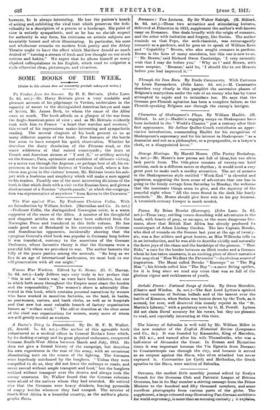DUBLIN EXPLORATIONS AND REFLECTIONS.*
In The Innocents at Home Mark Twain tolls us of a Nevada farmer who made his fortune silver-mining and " went to Europe and travelled. And when he came back he was never tired of telling about the fine hogs he had seen in England, and the gorgeous sheep he had seen in Spain, and the fine cattle he had noticed in the vicinity of Rome. He was full of the wonders of the Old World and advised every one to travel." Wo wore reminded at once of the Western millionaire when we took up the present volume, for its author's outlook, although naturally wider and more elevated, is equally professional and idiosyncratic. His interests are ahnost solely artistic. A quarter of his book is occupied with detailed and enthusiastic criticism of the pictures in the three public galleries of Dublin—pictures which merely happen to be there, as they might have happened to be in Liverpool or Manchester, and are no more significant of their surroundings than Cleopatra's Needle is of the Thames Embankment. Another large section is devoted chiefly to Georgian architecture, which, so far as it represents anything native, represents the taste of a wealthy leisured class which became practically extinct over a generation ago. Tho " Intellectuals " who bulk largely in the rest of the book have but little weight in the general life of the city ; for in Dublin a wealthy publican has far more influence, a prominent footballer or bookmaker is far more widely !mown, than John Eglinton or " :E." The business, clerical, and scholastic sides of Dublin are ignored, and the professional men dismissed with kindly contempt. Worst fault of all, the author has failed to consider the middle class in a town whose tone and colour are derived from the middle class—the sporting, cynical, easygoing middle class, at once irritable and tolerant, religious and profane, Nationalist and Laodicean.
When a writer with such marked limitations begins to give us his reflections we are not surprised to find them frequently super- ficial ; as, for instance, his endorsement of the absurd platitude that Irishmen can be led but not driven. A brilliant Dublin journalist pointed out long since that the exact opposite is the case. The Irish language maintains its existence only by the aid of compulsion, and Parnell held an undisputed grip on his followers only so long as he ruled them like an autocrat. When he con- descended to load, to advise, or to persuade—as he did in regard to the Land Courts, the No Rent Manifesto, and his struggle with Gladstone—he lost power and prestige at once.
When " An Englishman " confines himself to his own ground,
• Dublin Explorations and Dejlectivns. By an Englishman. Dublin and London : Maunsel and Co. 15s. DeLl however, he is always interesting. He has the painter's knack, of seizing and, exhibiting the vital trait which preserves the indi- viduality in a description of a person or a landscape. His point of view is entirely sympathetic, and as he has no slavish respect for authority in any form, his criticisms on artistic subjects are invariably honest and often illuminating. In particular, his sane and wholesome remarks on modern Irish poetry and the Abbey Theatre ought to have the effect which Matthew Arnold so much desired of " turning a stream of fresh and free thought on our stock notions and habits." We regret that he allows himself so many slipshod colloquialisms in his English, which tend to vulgarize a style otherwise clear, picturesque, and vivacious.



























 Previous page
Previous page